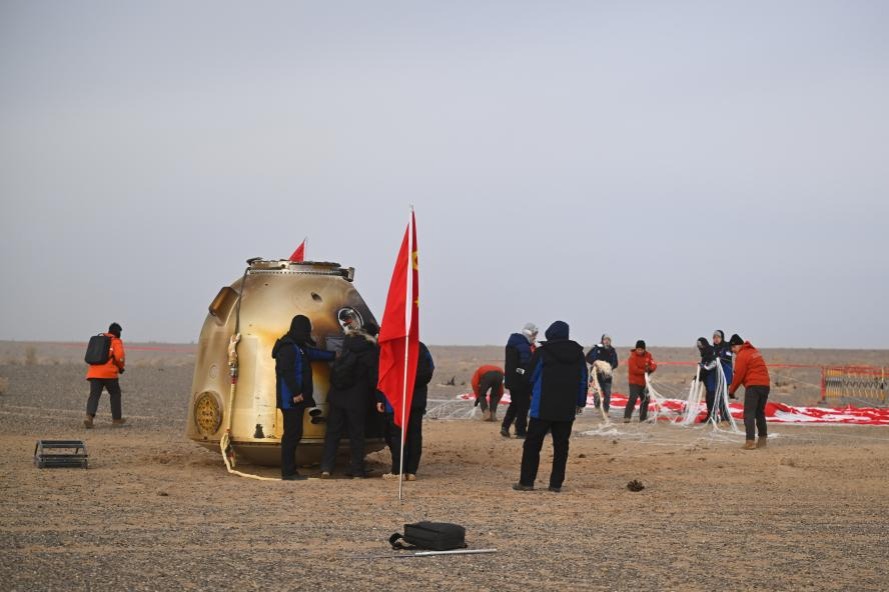News digest

China, US hold talks on military security
China and the United States met recently to discuss a military security code of conduct covering international waters and airspace, the Ministry of National Defense told China Daily.
Further concerns have been raised over frequent spying by the US along China's coastline after a "close encounter" between a Chinese navy fighter jet and a US Navy reconnaissance plane, some 200 km from the Chinese coast.
Observers said a code of conduct is needed to avoid friction between the two countries, but no major progress will be made until Washington stops conducting airspace espionage near Chinese territory.
The ministry said that under the consensus reached between China and the US in July, Beijing sent a delegation to the US on Aug 25 to attend a five-day working group meeting on the code of conduct.
"This is part of the annual plan for China-US military exchanges, aimed at implementing the consensus reached by the leaders of the two countries and boosting the establishment of a China-US military security code of conduct regarding international waters and airspace," the ministry said.
President Xi Jinping and his US counterpart Barack Obama met on the sidelines of the 3rd Nuclear Security Summit in March and agreed on the early formulation of the code of conduct.
Billionaire politician apologizes for TV tirade
Australian mining magnate and politician Clive Palmer has apologized to China's ambassador to Australia for a tirade in which he referred to the Chinese government as "bastards", setting off a firestorm in Canberra and Beijing.
The apology, in the form of a letter to Ambassador Ma Zhaoxu, came after Australian Prime Minister Tony Abbott and China's Ministry of Foreign Affairs condemned the remarks, first aired on television on Aug 18.
"I regret any hurt or anguish such comments may have caused any party and I look forward to greater understanding for peace and cooperation in the future," Palmer wrote in the letter.
The politician, whose Palmer United Party holds the balance of power in Parliament's upper house, released the letter, dated Aug 25, to the public on Aug 16.
China is Australia's biggest trading partner with two-way trade approaching $150 billion, representing more than 20 percent of Australia's total trade.
Chinese visitors to Singapore drop
A dramatic drop in the number of Chinese visitors to Singapore have seriously dented the Southeast Asian nation's first-half tourist figures, following the implementation of new measures in China last October, aimed at improving the country's travel industry.
Singapore Tourism Board said the number of Chinese visitors to the state in the first half of the year fell by 30 percent. Its international visitor arrivals in the first half of this year fell by 2.8 percent year-on-year. Excluding those, the country's arrivals grew by 2.3 percent year-on-year.
Hanoi sends envoy to help mend China ties
A high-ranking Vietnamese official visited China this week, in a move observers read as part of measures taken by Hanoi to repair its relationship with Beijing.
A series of anti-China riots flared in Vietnam in May following operations by a Chinese oil rig in waters near Zhongjian Island in the South China Sea.
The riots dealt a heavy blow to Vietnam's international image and its appeal to international investors.
Le Hong Anh, a member of Vietnam's political bureau and standing secretary of the Secretariat of the Communist Party of Vietnam Central Committee, visited on Aug 26-27, Xinhua News Agency said, acting as a special envoy for Nguyen Phu Trong, general secretary of the Communist Party of Vietnam Central Committee.
Pan Jin'e, an expert on Vietnamese studies at the Chinese Academy of Social Sciences, said the envoy's visit showed that Vietnam wants to repair ties with China as Hanoi strives hard to tackle challenges at home.
Lawmakers to counter espionage threat
Chinese lawmakers are considering renaming the National Security Law, which may be amended with more provisions to combat espionage.
A bill submitted for a first reading at the bi-monthly session of the Standing Committee of the National People's Congress suggests changing the name to the Counterespionage Law.
Geng Huichang, Minister of National Security, said that China's counterespionage agencies face new circumstances and challenges and need stronger support from legislation.
The current law mainly regulates the work of the country's national security agencies, whose major duty is counterespionage work.
The bill introduces new regulations for this work, which has been effective in practice but has not been written into the current law, said officials.
Under the proposals, foreign organizations and individuals conducting espionage activities, or who instigate and sponsor others to do so, will be punished, as will domestic organizations and individuals who spy on the country for foreign organizations and individuals.
China Daily
(China Daily Africa Weekly 08/29/2014 page3)
Today's Top News
- China reports 5% GDP growth in 2025
- Return capsule of Shenzhou XX safely returns to Earth
- Sanya rises as magnet for Russian tourists
- China's steady opening-up for Asia-Pacific economic growth
- Blueprint seen as a boon for entire world
- 'Kill line' an inevitable outcome of US system





























